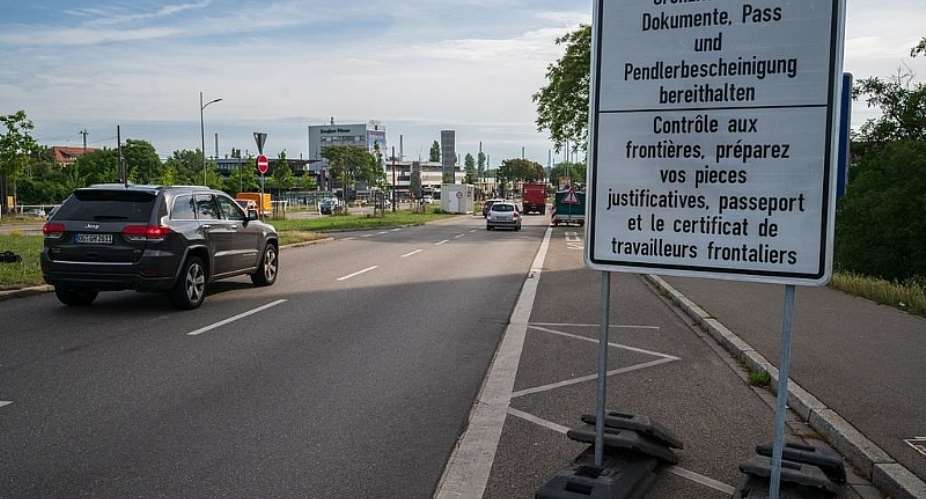Germany has declared France's Covid-battered eastern Moselle region a high-risk area for virus variants, prompting tougher entry rules for visitors. From Tuesday, travellers will need to show a negative coronavirus test completed in the previous 48 hours.
Last weekend, Germany declared France's Moselle region a high-risk area for virus variants, saying there was a "particularly high risk of infection due to widespread occurrence of SARS-CoV-2 virus variants".
From Tuesday, travellers from Moselle -- which lies next to Germany's Saarland and Rhineland-Palatinate states -- will have to produce a negative coronavirus test from the previous 48 hours.
Germany has already introduced stringent checks at its land borders with the Czech Republic and Austria's Tyrol region, ignoring calls from Brussels to keep frontiers within the European Union open.
Random checks on vehicles from France
At those crossings, only Germans and non-German residents are allowed to enter, as well as lorry drivers and cross-border commuters working in certain job categories.
Every vehicle is stopped and occupants must produce a negative test that is less than 48 hours old.
The checks on the German side of the Moselle crossing are expected to be less strict, a spokesman at the German interior ministry told the French AFP news agency.
Instead of systematic checks, police will randomly stop vehicles on the German side and ask drivers to show "a negative test and their online entry registration," he said.
Germany has grown increasingly concerned in recent weeks about the rapid spread of more contagious strains of the coronavirus, especially those first detected in Britain and South Africa.
Efforts being made to avoid complete closure
The coronavirus is spreading faster in Moselle than elsewhere in France, but officials have pleaded with Berlin to avoid a full closure of the border.
We are taking steps to avoid a complete closure of the German border, France's Europe Minister Clement Beaune said on Sunday.
"We don't want that," he said, adding that talks were ongoing with Berlin to find solutions for the 16,000 commuters who travel between Moselle and Germany every day for work.
Beaune suggested the restrictions could perhaps be eased so that drivers had to produce a fresh Covid-19 test "every two or three days" instead of daily.
The German interior ministry spokesman said the two neighbours would discuss details of the border restrictions on Monday.
Not so quiet on the eastern front
Asked why the French checks would not be as stringent as those along the Czech and Austrian frontiers, the spokesman said Saarland and Rhineland-Palatinate had not requested border closures.
"And there is a good cooperation between the affected German and French regions," he added.
Austrian Chancellor Sebastian Kurz, who has been critical of Germany's border curbs, on Friday called for an EU-wide approach to frontiers rather than go-it-alone decisions.
"Measures that lead to endangering the single market, prevent people from getting to their workplace or tear families apart, I don't find very sensible," Kurz told the German daily Merkur.





 Akufo-Addo spotted ordering chiefs to stand for his handshake
Akufo-Addo spotted ordering chiefs to stand for his handshake
 Akufo-Addo ‘disrespects’ every chief in Ghana except Okyenhene — NDC Communicato...
Akufo-Addo ‘disrespects’ every chief in Ghana except Okyenhene — NDC Communicato...
 Supreme Court clears way for dual citizens to hold key public positions
Supreme Court clears way for dual citizens to hold key public positions
 Be transparent, don’t suppress the truth – Prof. Opoku-Agyemang to Jean Mensa
Be transparent, don’t suppress the truth – Prof. Opoku-Agyemang to Jean Mensa
 ‘I won’t tell the world I was only a driver’s mate during challenges’ – Prof Jan...
‘I won’t tell the world I was only a driver’s mate during challenges’ – Prof Jan...
 We’ll prosecute corrupt officials of Akufo-Addo’s govt – Prof Jane Naana
We’ll prosecute corrupt officials of Akufo-Addo’s govt – Prof Jane Naana
 [Full text] Acceptance speech by Prof Jane Naana Opoku-Agyemang as 2024 NDC Runn...
[Full text] Acceptance speech by Prof Jane Naana Opoku-Agyemang as 2024 NDC Runn...
 Election 2024: Don’t be complacent, we haven’t won yet – Asiedu Nketia cautions ...
Election 2024: Don’t be complacent, we haven’t won yet – Asiedu Nketia cautions ...
 Election 2024: Stop fighting over positions in Mahama’s next govt – Asiedu Nketi...
Election 2024: Stop fighting over positions in Mahama’s next govt – Asiedu Nketi...
 Prof Jane Naana Opoku-Agyemang will restore dignity of vice presidency – Fifi Kw...
Prof Jane Naana Opoku-Agyemang will restore dignity of vice presidency – Fifi Kw...
